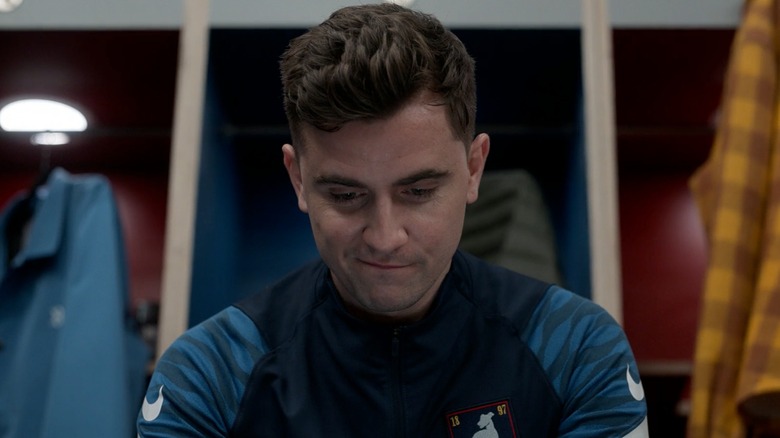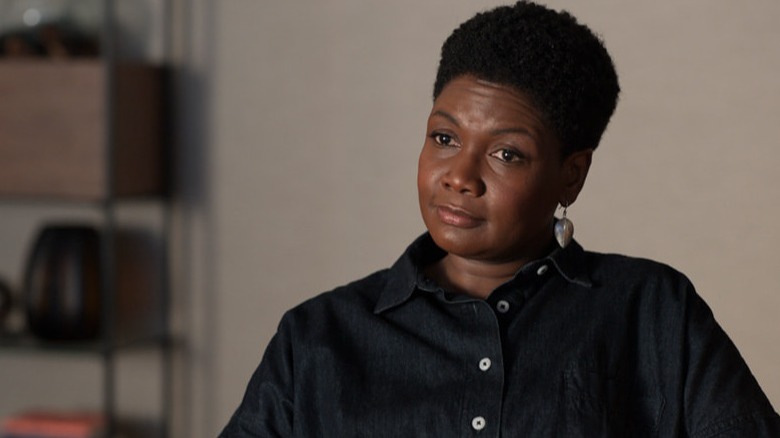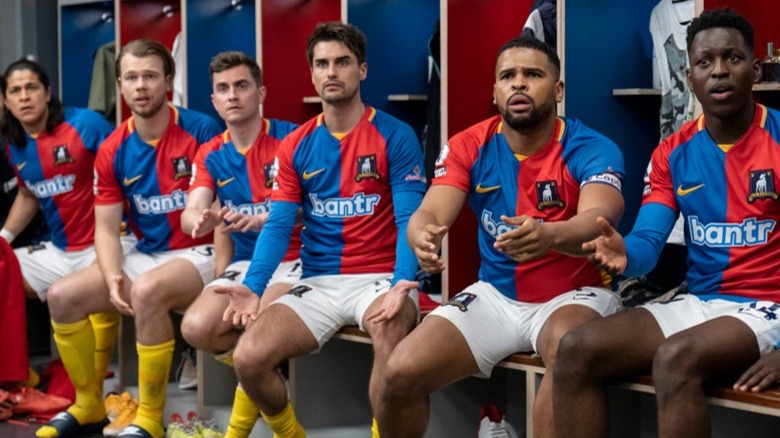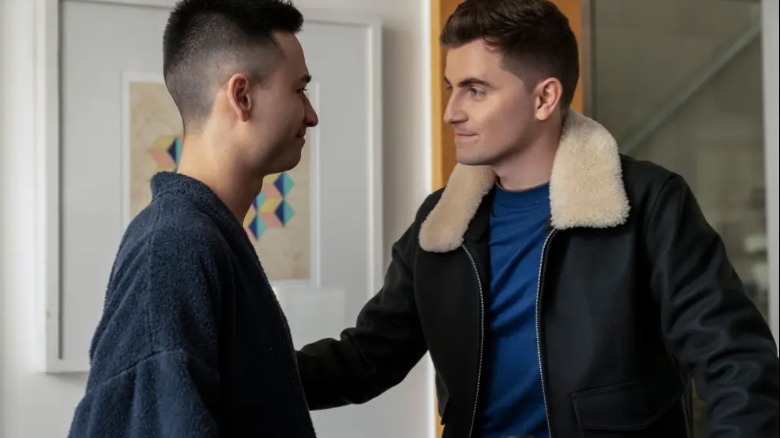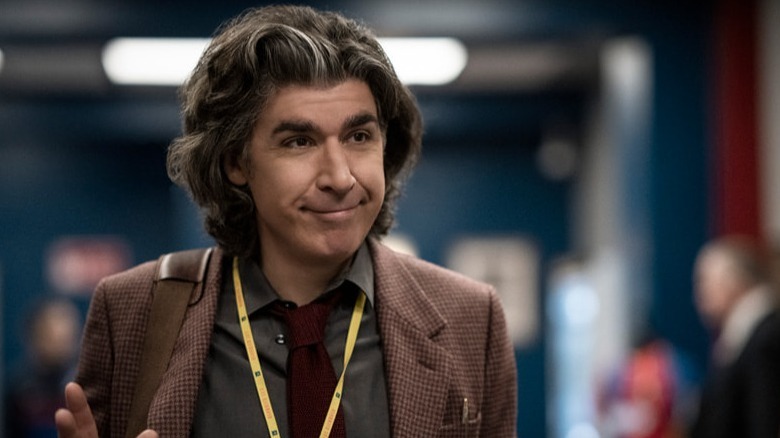Ted Lasso Season 3 Offers A Perfect Monologue About Coming Out
This post contains spoilers for the latest episode of "Ted Lasso" season 3.
When TV shows and movies talk about "coming out," there are a few things they don't tend to talk about. One of them is that coming out is different for everyone, and for many people, it's a process — sometimes a lifelong one. The idea that a character can come out over the course of a single episode and be perfectly accepted by both others and themselves is delightful, but for some of us, it's sheer fantasy.
In reality, queer and trans people have the choice to come out or allow themselves to be labeled as straight or cis again and again, not just among family and friends but also in public, at work, and even in online spaces. We can write a letter to our loved ones or wear a pride pin that explains our identity, but as long as we keep meeting new people, we'll have to keep coming out — or choosing not to. Coming out can be cathartic, but for some people, it can also be messy and anxiety-inducing, and in select scenarios, can frankly feel like it's not worth the effort.
The ache
I never expected the peppy Apple TV+ soccer comedy "Ted Lasso" to include an appropriately nuanced conversation about coming out, but it did exactly that this week in an episode that saw teammate Colin (Billy Harris) open up to writer Trent (James Lance) about his tricky personal relationship to the idea of being "out." After Colin runs into Trent at a gay bar and realizes the former reporter knows his secret, he reigns in the urge to flee and instead sits down for a heart-to-heart with his colleague. The result is the most emotionally vulnerable and honest moment "Ted Lasso" has delivered all season.
"My whole life is two lives, really," Colin tells Trent after the writer reveals he had to come out twice to his daughter to get her to believe him. "I've got my work life — no one at the club knows," he explains. "I'd like to think they wouldn't care, but it's just easier that way. Then I've got my dating life." Colin says that some of the men he sees think it's sexy that they're keeping their relationship a secret, while others "get tired and move on." He tells Trent that he realized he wasn't entirely happy keeping up two versions of himself when he started speaking with the team psychologist last season. "She helped me realize that I have an ache," he explained. "An ache for both my lives to be my only life."
Coming out can be an ongoing process
I've never been a closeted gay English footballer, but I know that ache well. I've lived in a sort of coming out limbo for a long time, openly queer on the internet yet private about my dating life around most of my family. At some workplaces, depending on the likelihood that I'll face harassment, I've refused to offer up details about my orientation and didn't correct anyone who assumed I was straight. At others, I've been frank about my bisexuality from day one. It's clear to anyone who so much as reads my email signature (I'm part of GALECA, the LGBTQ+ critics group) that I'm a member of the queer community, yet I still discourage some people I know from Googling me on the off chance that they find out.
For me, coming out has never been a linear process, and it's hardly ever felt like an event. By the time I officially decided on a label, my queer friends from college had already assumed I was bi years earlier. Some moments have felt major, like when I finally addressed the elephant in the room with my mom last year (she's the best, and was great about it), but others are minor or even accidental, like when I post about pride-related holidays and get a flurry of awkward "I didn't know!" messages. Coming out is often portrayed on screen as something that people only avoid doing out of fear, but the reality is a lot more complicated, and Colin's description of his two lives reflects that.
'To be able to kiss my fella'
Colin has never been a major character in "Ted Lasso," but this scene had a major impact on me. It's rare to see a series take on the strange, sometimes latent pain of being half-out, and of remaining so not out of fear or shame, but out of a sort of habitual protectiveness over the life one has already built. "I don't want to be a spokesperson. I don't want a bunch of apologies," Colin says. "All I want is for when we win a match, to be able to kiss my fella the same way the guys get to kiss their girls." I can relate to that, too. Unfortunately, it's impossible to tell the world who you are without the world responding, and that's a daunting idea for someone who values their peace and privacy.
It might be Colin's last lines that hit me the hardest. "I know we can't fix every ache inside of us," he tells Trent, "but I shouldn't have to pretend it's not there, either." When we choose to remain partially closeted indefinitely, whether it's in an unsafe work environment or around a homophobic grandparent, or in any number of perfectly valid scenarios, we tend to carry that ache of a separated self with us — and don't always have a safe place to put it down. There's no way to acknowledge the pain of playing different versions of ourselves depending on what room we're standing in because to do so would be to stop inhabiting our roles entirely.
Ted Lasso rejects the tidy coming out narrative
There's no easy solution to this feeling of a split self, but "Ted Lasso" offers up one option; find a friend, and share your full self with them. Trent and Colin may seem like a random pair, but Lance and Harris are two great actors, with the latter only now coming into his own with this beautifully delivered monologue. You can hear the weariness and hope mingle in Harris' voice as he envisions kissing a boyfriend after a big win, and the relief at telling someone about the ache. Every now and again, the lessons in emotional vulnerability shared by "Ted Lasso" can feel a bit pat, but this one is nothing of the sort. Instead, it's one of the show's most transcendent moments.
Years of watching TV shows and movies with tidy coming-out narratives have conditioned me to want to end this with an easy solution. I could say that if you practice being one person around enough people, eventually you might forget you were ever trying to be two. I could say that hearing Colin describe the ache he feels helped me to see and understand my own and that writing these words made me feel more like I'm living one life than I have in a long time. Both statements might be true, but they also both oversimplify the topic at hand, and the beauty of this scene is that it refuses to keep things simple. "Ted Lasso" gave us a rare gift this week, framing coming out not as a linear, tidy queer rite of passage, but as a deeply personal ongoing experience.
Every version of me is thankful for it.
